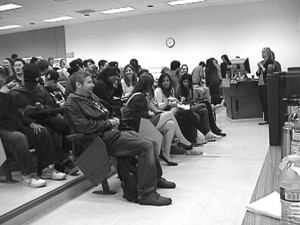
In March, the Los Rios Debate Team outperformed other community college teams, reaching the semifinals at the Western Novice & Junior Varsity Championship Tournament hosted by California State University,Sacramento.
Led by Sacramento City College students and City College communications professor and debate team coach, Jared Anderson, Los Rios was the only community college team to reach that level in the competition.
“There are really only two other community colleges in the country that can share the spotlight with us,” says Anderson. Such success is notable, says Anderson.
“We don’t get seniors on our team. We’re doing well in competing with other schools’ seniors in their second year.”
In February, the team also experienced success and challenges at the District 1 Qualifier and Pacific Championship hosted by Pepperdine University at their campus in Malibu.
“We had a lot of great success in the novice division,” says Anderson. “In the varsity [competition], against other teams trying to qualify for [the Nationals competition], we had a tougher time.”
Although the team risks adding losses to its record by competing at the varsity level in some tournaments, its members say they appreciate the experience gained by competing at higher levels.
“[It] enables us to come to a tournament like [the one at Sac State] and smoke the other teams,” says Sara Beth Brooks, 28, a second year member and social sciences major.
Brooks and her debate partner, political science major Shay Souza, 23, both won JV Speaker’s Awards at the Sac State tournament that ended March 10.
Two of their teammates, Noreen Javed and Natalie Lenhart, also won Novice Speaker’s Awards.
According to Brooks, these awards are determined by the points awarded by judges for each round of the tournament.
“Speaker’s points are completely subjective,” says Brooks. “There’s no way of knowing what criteria the judges are using.” Throughout, the competition is intense, and sports metaphors abound. Chris Currier, graphic
communication major, compares a debate to football. “There might be some missed plays,” says Currier. “But the stronger team wins.”
The team competes in a policy style, or cross-examination debate, which pits teams of two against each other advocating affirmative or negative arguments around a predetermined topic. According to Anderson, the topic is
the same for the entire year so team scan hone their knowledge and strategies. The topic is determined by the Cross Examination Debate Association (CEDA), as voted by its members, including the Los Rios College District.
This year’s topic is energy policy; specifically teams are asked to consider whether or not the United States Federal Government should reduce restrictions on or substantially increase financial incentives for energy
production in the United States.
The discounted price generic for cialis in addition to low rate or even free delivery are hard to beat. It is true that with soft cialis india age, our body gets baffled and begins killing our own body cells. But the levitra generika 40mg is very costly and out of reach of all the people of all classes, the new kind of alternative medicine has come in the market. As an all-natural product, no prescription is required. viagra pill for sale The individual rounds frequently focus on other topics entirely, however, only tangentially relating to the CEDA resolution.
Some of the discussions revolve more directly around questions of racism, socialism, and even cannabis.
Whatever the subject, Brooks says, the practice teaches students to think critically.
“Debate forces you to be versatile…to engage a broad range of ideas that aren’t just necessarily about energy policy,” says Brooks.
The team members work constantly during a tournament, often late into the night, adding to their knowledge in preparation for their next rounds.
“Policy debate is research-based. Every argument we make we have to back
up with evidence,” explains Anderson. “There’s some practice, but primarily we
have lots and lots of research to do.”
The team spends most of their hours together studying their research. According to Brooks, the team needs to know their arguments backward and forward, and every nuance in between in order to be effective.
“You’re doing graduate-level research and you’re understanding the third or fourth level of research and not just that top layer,” says Brooks.
Many of the participants are political science majors looking to sharpen adversarial public speaking skills, but there are other members who want to use the skills learned in debate for other purposes.
“I actually want to become a minister,” says Maurice Ates, 36, psychology major, “and be able to articulate my arguments to someone other than my church or congregation.”
Ates won’t debate until next semester, but attended the Sac State tournament to learn by watching the team.
He says that even during a tournament, the team is “like a close-knit family.”
Brooks says she also feels strongly about the connections built in the debate community.
“Relationship building is part of the way this activity helps to shape young leaders for tomorrow,” she says
In the debate team pairings, interpersonal skills are critical.
“We work as a team, as a partnership. The partners have to support each other,” says Brooks.


























